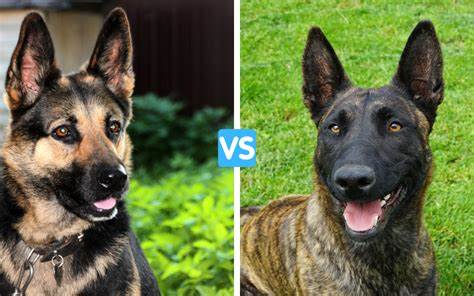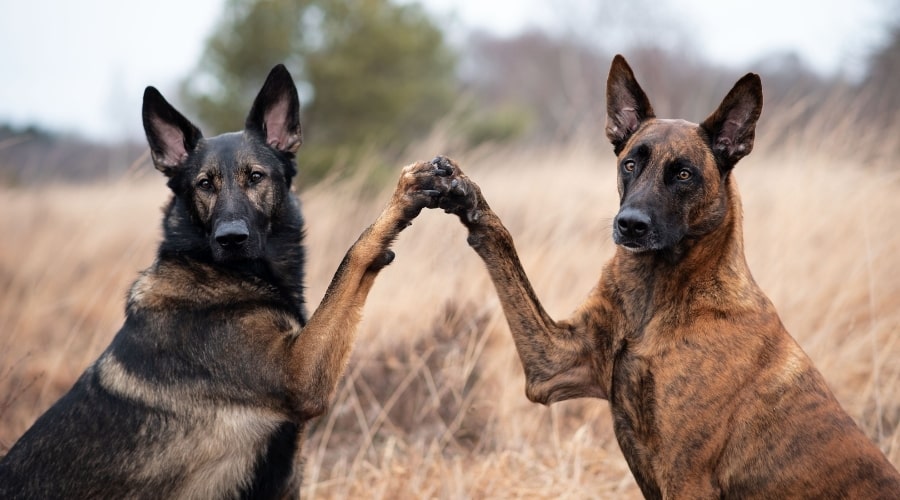The number of existing dog breeds worldwide could impress anyone, even considering how different they can be. German Shepherds are the most recognized, having very specific characteristics that enchant anyone. Although they have a much-underappreciated cousin, just as impressive, the Dutch Shepherd, with whom they are often confused.
Many things separate these two races by a somewhat large gap but in a certain way necessary. Both are unique to the ideal that their temperament and even the possible problems in their health vary. Knowing all the information about both dogs is essential if you are thinking of adopting either of them. Besides, having things clear will allow you to take care of your pet in the proper way.
The Origins and Classification of Dutch Shepherd
Contents
Despite being very obvious the origins of both breeds thanks to their names, certain information should know. For example, the Dutch Shepherd discovers in the Netherlands and is one of the most versatile dogs globally.
They are used to control livestock and even make sure other animals like chickens don’t sneak into the kitchen. In this way, they could see acting as guardians, taking care of children, and even pulling cars.
This breed was considered part of the collection, which changed when assigned as herding. As far as German Shepherds are popularly known to come from Germany, their name indicates so.
Before, the ancestors of these dogs were widely used for herding, although the variations were wider. A name called Captain Max von Stephanitz was the one who took the first step towards the creation of the German Shepherds.
Several districts were toured in the country’s northern and central areas so that the long-awaited race finally arrived.
Physical appearance and traits
Both dogs have characteristics that differ and resemble them. In terms of appearance, these are some:
-
Coats
Dutch Shepherds have three types in their coat, the short, the long, and the rough. The first has stiff hair that is too close to its body. It is quite uniform.
Anyone with long hair will enjoy a smooth texture that will feel just as rough to the touch. In contrast, dogs with a rough coat are dense and fuzzy, and all have an undercoat.
Colors can vary a bit, from black and brown brindle to both silver and gold bases. German Shepherds, on the other hand, have a double coat. The outer one is of medium length and somewhat wavy, apart from being thick.
In colors, the easiest to find is black with tan and dogs with one-tone fur. The gray, red, or sable are the most common and fascinating.
-
Size
An average Dutch Shepherd weighs between 42 to 75 pounds, but it can be more with German Shepherds. Males reach 90 pounds, while females reach a maximum of 70 pounds.
A German Shepherd is also taller in comparison, standing between 24 and 26 inches tall. Dutch Shepherds only get to 21.5 to 24.5 inches tall, which is an impressive difference.
-
Appearance
When looking at a Dutch Shepherd, it is easy to see that its head is peculiarly shaped like a wedge. In general, this is proportional to its entire body, apart from the fact that the housing has the length of its skull.
These dogs are characterized by being strong and therefore have fairly solid bones, but this does not make them heavy. They are long and even skinny, which contrasts nicely with their lively and intelligent expression.
The most notable feature of German Shepherds is their head, with long snouts and pointed ears. They have a noble appearance, and you can tell that they are very intelligent.
Similar to Dutch Shepherds, they tend to be muscular but not overly so. The look is also elongated and slim, but with the difference that the coat gives them a bit more volume.
Personality traits
German Shepherds are working dogs, but they also tend to adapt well to families. They are some of the bravest and loyal beings that exist, but they are not so friendly with other pets.
A rather remarkable trait is intelligence, and for this reason, it is quite easy to train them. In contrast, Dutch Shepherds are incredible for the family environment, and they relate very well with other dogs.
Dutch Shepherds also serve as guardians, and their behavior still depends on how busy they are. They are very intelligent but not as smart as a German Shepherd, yet the ease of training them is incredible.
Health and Genetic Concerns
A Dutch Shepherd is quite healthy compared to other breeds, but it is still possible for him to develop one of these problems:
- Hip or elbow dysplasia
- Masticatory myositis
- Intestinal inflammation
- Others
German Shepherds can suffer from:
- Perianal fistula
- Megaesophagus
- Osteoarthritis
- •Others
In general, a Dutch Shepherd lives longer than Germans, although some may not think so. The former arrive between the ages of 11 to 14, while German Shepherds only live for 7 to 10 years.
Difference between a Dutch and German shepherd

One of the few similarities between both races is their name since their differences are quite a few. Dutch Shepherds are smaller and tend to have brindle coats; it appears that German Shepherds have more health problems.
There are already several personality similarities, such as loyalty and obedience, but Dutch shepherds are more independent. A notable difference is the price, German Shepherds at $ 900 while Dutch go from $ 1200.
-
Exercise needs
Both dogs require many exercises since their bodies are designed for this as they are working dogs. Long walks are a great option, as are games or mental exercises.
It is a good idea for a German Shepherd to take agility classes as this contributes positively to his mind. In this way, boredom will not be present in his pet, and he will remain to behave well.
-
Grooming
Hair loss can be a big problem in German Shepherds but kept in check with brushing. As for Dutch shepherds, not so much preparation is needed, at least with short-haired ones.
The shedding seasons in both breeds require more attention, that is, autumn and winter, respectively.
How To Train Dutch Shepherds?
Due to the great intelligence of Dutch Shepherds, it is not so difficult to train them. It will only take a few basic techniques at home, it may take a while, but you are sure to learn.
You have to consider that the dog is always eager to please its owner, which will help. Positive reinforcement is the best option of all, apart from being constant when training.
-
Establish your control
Establishing your role as alpha will also help you curb Dutch stubbornness and ensure your pet’s proper behavior.
-
Agility training
Once your puppy is grown, you can try agility training to keep them busy and give them the physical and mental stimulation they need.




